Caffeine Free Herbal Teas: Health Benefits and Drawbacks Compared
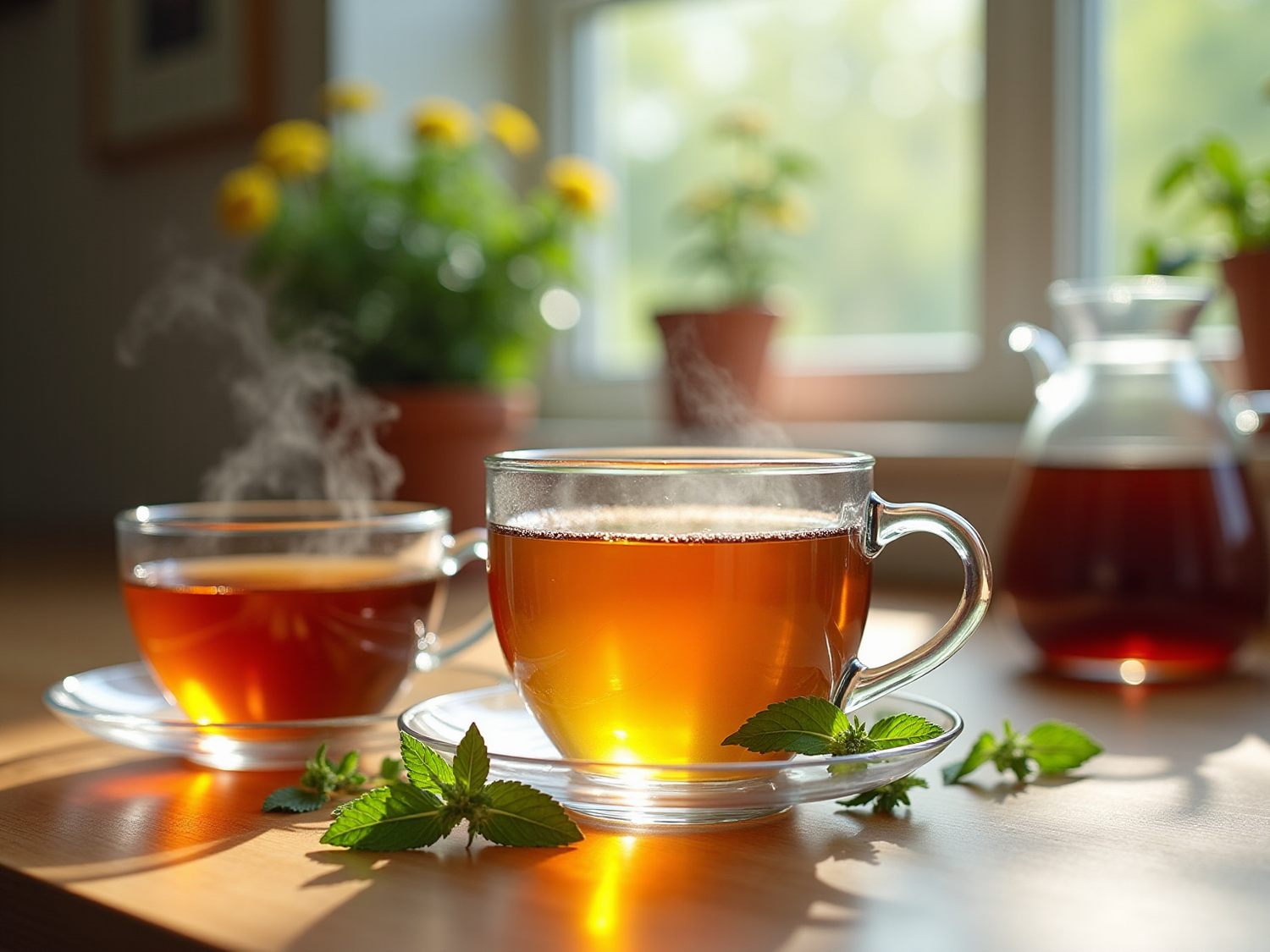
Overview
Caffeine-free herbal teas are a wonderful choice for those seeking to enhance their well-being. They offer numerous health benefits, such as promoting relaxation and aiding digestion, which resonates deeply with health-conscious consumers. For instance:
- Chamomile is cherished for its calming effects.
- Peppermint is known to support digestive health.
These teas not only soothe the mind but also nurture the body.
However, it’s important to consider the potential drawbacks of decaffeinated teas. During the decaffeination process, some beneficial compounds may be lost, which can affect the overall experience. As you explore your options, remember that choosing the right tea can be a gentle step towards a healthier lifestyle.
Have you ever enjoyed a warm cup of chamomile after a long day? Or perhaps sipped on peppermint tea to ease your digestion? These moments can be truly comforting and enriching. We encourage you to discover the delightful world of herbal teas and find those that resonate with your personal wellness journey.
Introduction
In a world that increasingly values wellness, choosing between caffeine-free herbal teas and decaffeinated teas has become an important decision for those who prioritize health. Herbal tisanes, derived from a vibrant array of plants, offer a naturally caffeine-free alternative, presenting unique flavors and a host of health benefits. On the other hand, decaf teas, originating from traditional tea leaves, provide a familiar taste with lower caffeine levels, though they may come with a slight loss of beneficial compounds.
As the demand for natural remedies continues to rise, understanding the differences between these two options is crucial for anyone looking to enhance their well-being. From soothing chamomile to refreshing peppermint, the right choice can not only satisfy your taste buds but also support a holistic approach to health. So, why not explore these delightful options and discover which tea resonates with your wellness journey?
Defining Caffeine-Free Herbal Teas and Decaf Teas
Caffeine-free herbal teas, known as herbal tisanes, are crafted from a delightful variety of plants, including herbs, flowers, and fruits, all naturally devoid of caffeine. Examples like chamomile, peppermint, and rooibos not only offer unique flavors but also bring their own health benefits. In contrast, decaffeinated brews come from traditional leaves, such as black or green varieties, which undergo a decaffeination process. This process typically removes most of the caffeine but may leave behind trace amounts, generally between 1 to 8 mg per cup. As Nigel Melican, Founder and Managing Director of Teacraft, Ltd., insightfully notes, "You cannot (despite what some notables in the tea industry believe) you just cannot significantly decaffeinate tea by using a 30-second hot water wash (in fact 30 seconds leaves 91 percent of the caffeine in place – and removes a lot of the antioxidants)." This distinction is crucial for those sensitive to caffeine or actively seeking to eliminate it from their diets.
Studies suggest that caffeine-free herbal teas provide various health advantages, such as promoting relaxation and aiding digestion, making them an appealing choice for individuals prioritizing wellness. Additionally, research indicates that plant-based tisanes can enhance overall well-being, with many consumers reporting positive effects after incorporating them into their routines. A significant percentage of health-conscious individuals prefer caffeine-free herbal teas over decaffeinated options, highlighting a growing trend towards natural wellness solutions.
Gardenika's Ayurvedic Detox Blend beautifully exemplifies this trend, crafted with organic ingredients that support immune function and digestive health. With USDA Organic and KSA Kosher certifications, along with third-party lab testing for safety and purity, Gardenika ensures that every cup reflects a commitment to quality. Customers have shared their appreciation for this blend, with over 2000 five-star reviews confirming its effectiveness. A case study titled 'Caffeine Levels in Different Types of Tea' reveals that the common belief that white and green varieties contain lower caffeine levels compared to oolong and black varieties is misleading. The findings indicate that white tea may actually have higher caffeine levels than green tea, and overall, all tea types have similar caffeine contents, debunking the myth that green tea is a lower-caffeine option.
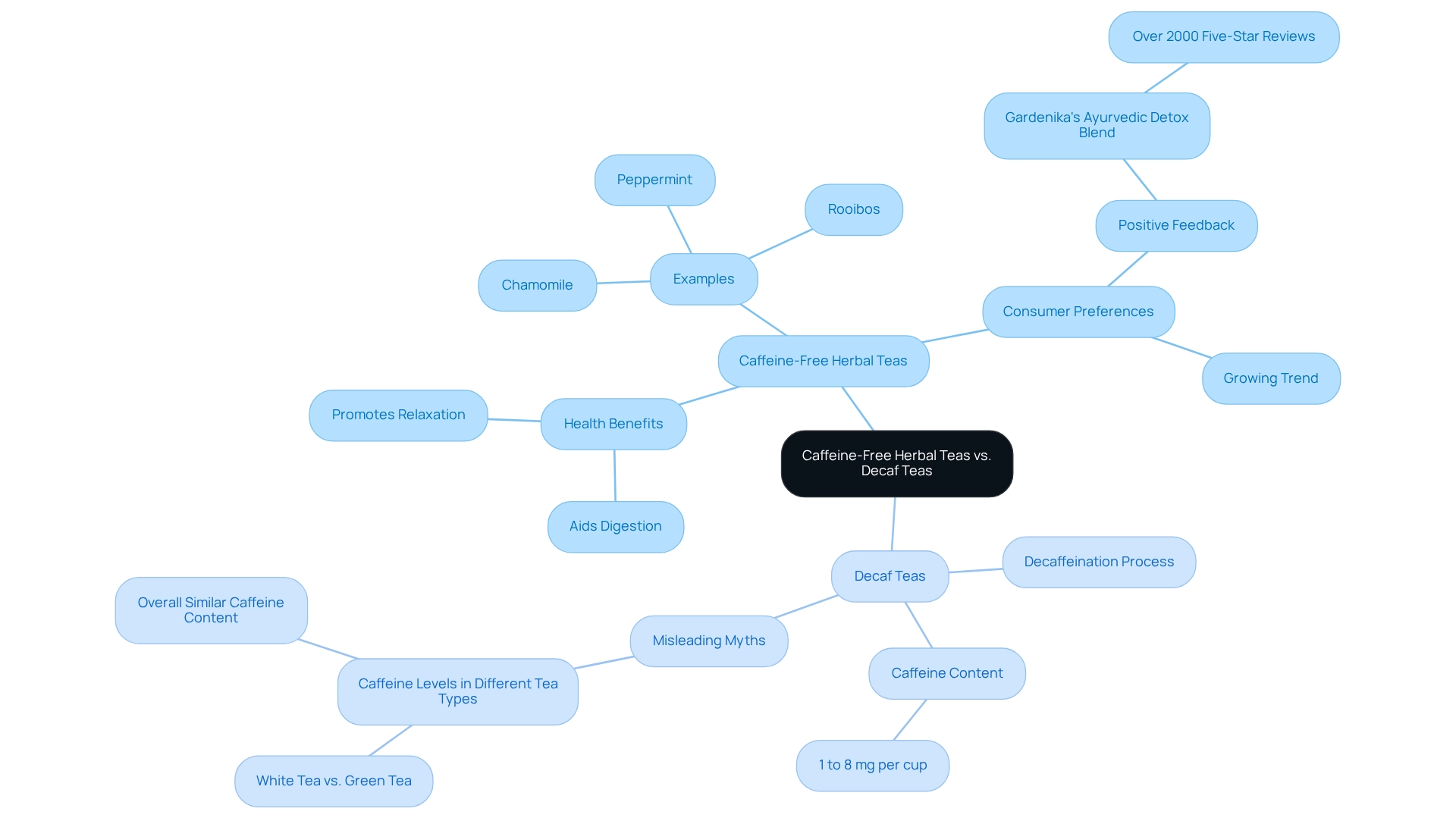
Health Benefits of Caffeine-Free Herbal Teas and Decaf Teas
Are you looking for a way to enhance your wellness journey? Caffeine-free herbal teas offer a variety of health advantages tailored for those who prioritize their well-being. Our organic loose leaf teas, crafted with time-tested herbs, can bring balance and wellness into your life.
-
Chamomile tea, celebrated for its calming properties, is often chosen to promote restful sleep and alleviate anxiety. Research shows that chamomile can significantly improve sleep quality, making it a cherished choice for those seeking relaxation.
-
Peppermint tea is another wonderful option, known for its digestive properties. It not only aids digestion but also alleviates headaches, providing a refreshing lift for both mind and body. A case study titled 'Enhancing Cognitive Function with Peppermint' highlights how the aroma of peppermint can boost focus, memory, and alertness, making it an excellent choice for anyone preparing for important tasks.
-
Rooibos tea stands out with its rich antioxidant properties, which may help combat oxidative stress and promote overall well-being. Its unique profile includes polyphenols that contribute to its health-enhancing qualities. While decaffeinated beverages maintain many benefits of their caffeinated counterparts, some beneficial compounds may be reduced during the decaffeination process. Nevertheless, they still provide valuable antioxidants, akin to those found in green tea, which can support heart health and reduce inflammation. Plus, plant-based infusions boast a cholesterol level of 0mg, accounting for 0% of the advised consumption, emphasizing their health-positive characteristics.
It's important to remember that while these infusions are generally safe for most, being mindful of potential allergies or medication interactions is crucial, as noted by market research specialist Trishita Deb. Overall, caffeine-free herbal teas serve not only as delightful beverages but also as potent natural remedies, making them an ideal choice for health-conscious individuals eager to enhance their wellness.
The growing global demand for plant-based infusions reflects a heightened interest in natural wellness options. Their inclusion in worldwide healthcare policies further underscores their recognized advantages. Why not explore the benefits of our organic loose leaf teas and find the perfect blend for your wellness journey?
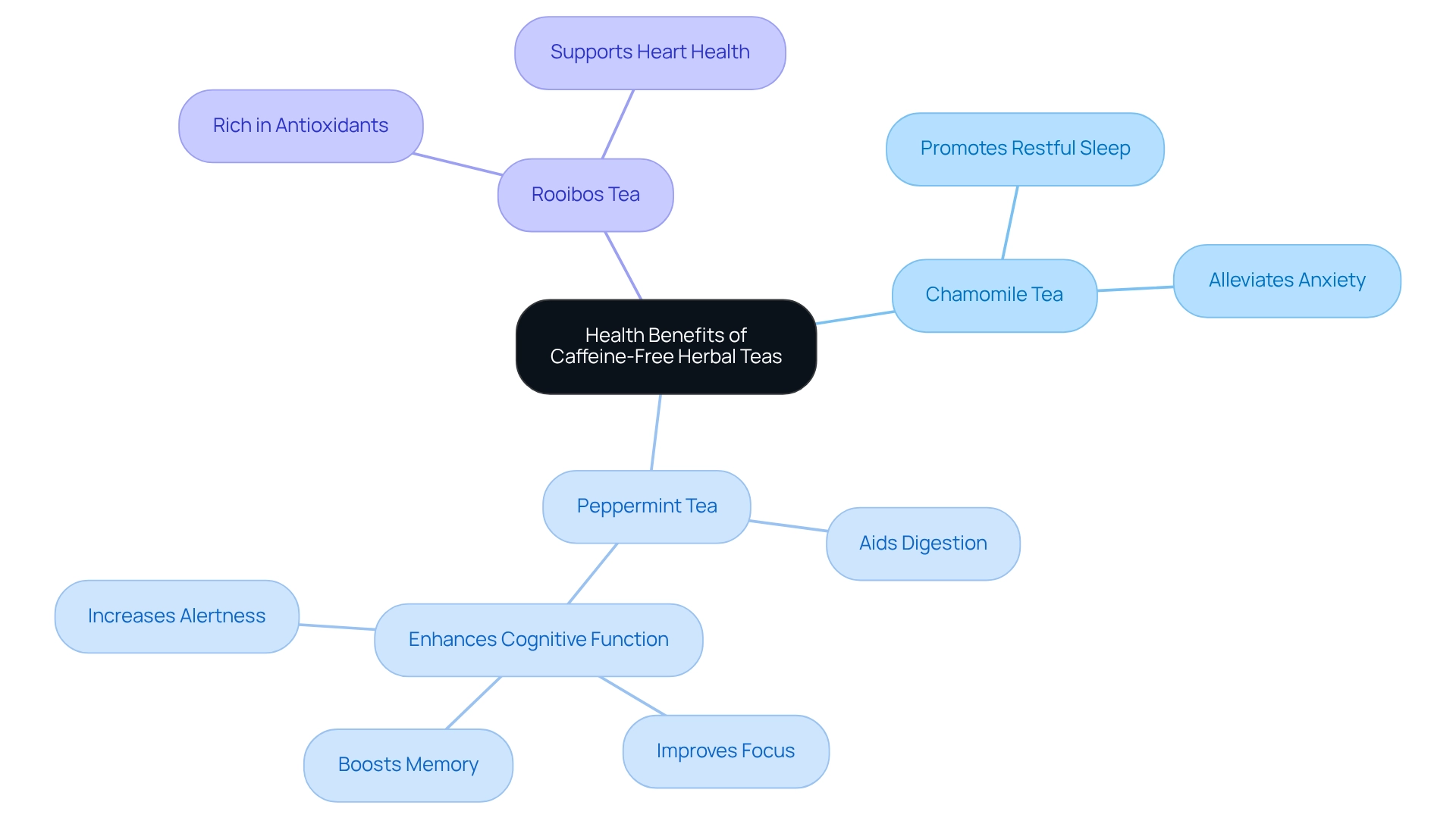
Comparing Drawbacks: Caffeine-Free Herbal Teas vs. Decaf Teas
While caffeine-free herbal teas are generally safe and beneficial, some individuals may have allergic reactions to certain plants or experience digestive issues. We understand your concerns and craft our caffeine-free herbal teas with organic loose leaf infusions and time-tested herbs that promote wellness and balance. Each sip offers relaxation and immune support, making your wellness journey a little brighter.
The flavor profiles of herbal infusions can differ significantly from traditional varieties, which may not appeal to everyone. Moreover, decaffeinated beverages, while lower in caffeine, can still contain trace amounts that might affect those with heightened sensitivity. It's essential to recognize that the decaffeination process can strip away some beneficial antioxidants and polyphenols, potentially diminishing the advantages compared to their fully caffeinated counterparts.
This trade-off is an important consideration for health-conscious consumers. However, with our unwavering commitment to quality, including USDA Organic and Kosher certifications, you can trust that our products provide pure, health-focused choices. We invite you to explore our range of herbal teas and discover the nurturing benefits they can bring to your life.
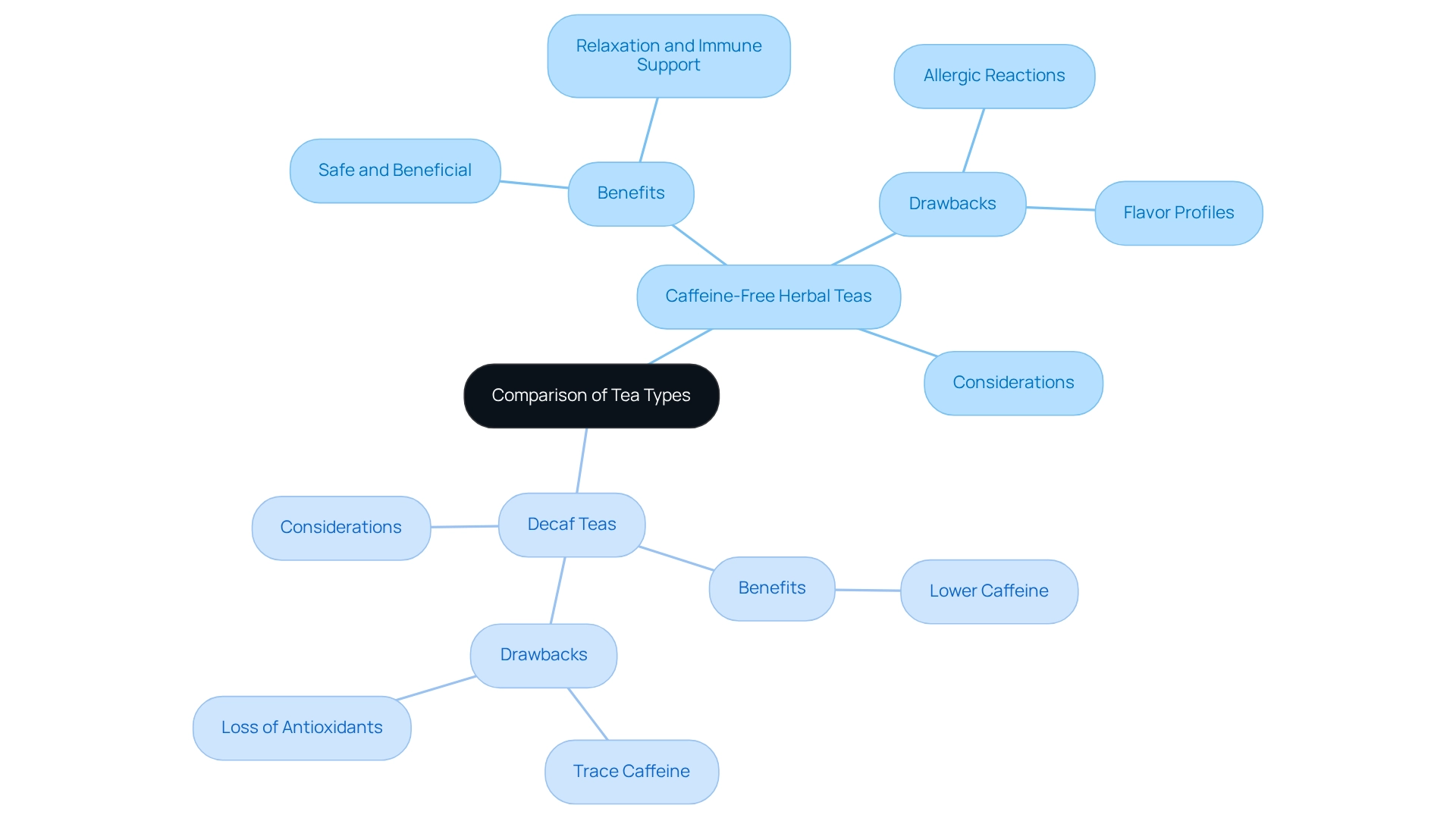
Choosing the Right Option for Your Health Needs
Choosing between caffeine-free herbal teas and decaffeinated options invites a thoughtful evaluation of your personal health objectives and caffeine sensitivity. Caffeine-free herbal teas, like chamomile and lavender, are wonderful choices for those seeking calming drinks that encourage relaxation and enhance sleep quality. These flavorful options are rich in substances that promote overall wellness, aligning beautifully with our commitment to offering USDA Organic and Kosher certified organic loose leaf infusions made from time-honored herbs. Each Ayurvedic blend is thoughtfully crafted to support your body's inherent functions, providing relaxation and immune assistance in every soothing sip.
On the other hand, decaffeinated infusions, including decaffeinated green and black varieties, offer a familiar flavor for traditional beverage lovers who wish to reduce their caffeine intake. These infusions retain many beneficial qualities of their caffeinated counterparts while significantly lessening stimulant effects.
Studies reveal that consumer preferences are shifting towards caffeine-free herbal teas, with many individuals prioritizing wellness benefits over traditional flavors. In 2025, a noteworthy proportion of tea drinkers expressed a preference for caffeine-free herbal teas due to their perceived wellness advantages, particularly in promoting relaxation and aiding sleep. This trend is reflected in Gardenika's offerings, which emphasize premium organic loose leaf infusions and Ayurvedic blends designed to foster wellness and harmony.
For those with specific wellness concerns or conditions, it is wise to consult a medical professional before introducing new plant-based ingredients or altering caffeine consumption. This ensures that your chosen tea aligns with your individual wellness needs and goals, enhancing the benefits of each cup. Incorporating insights from health professionals can also provide valuable perspectives on the health benefits and environmental impacts of herbal teas, reinforcing the importance of making informed choices in your tea consumption.
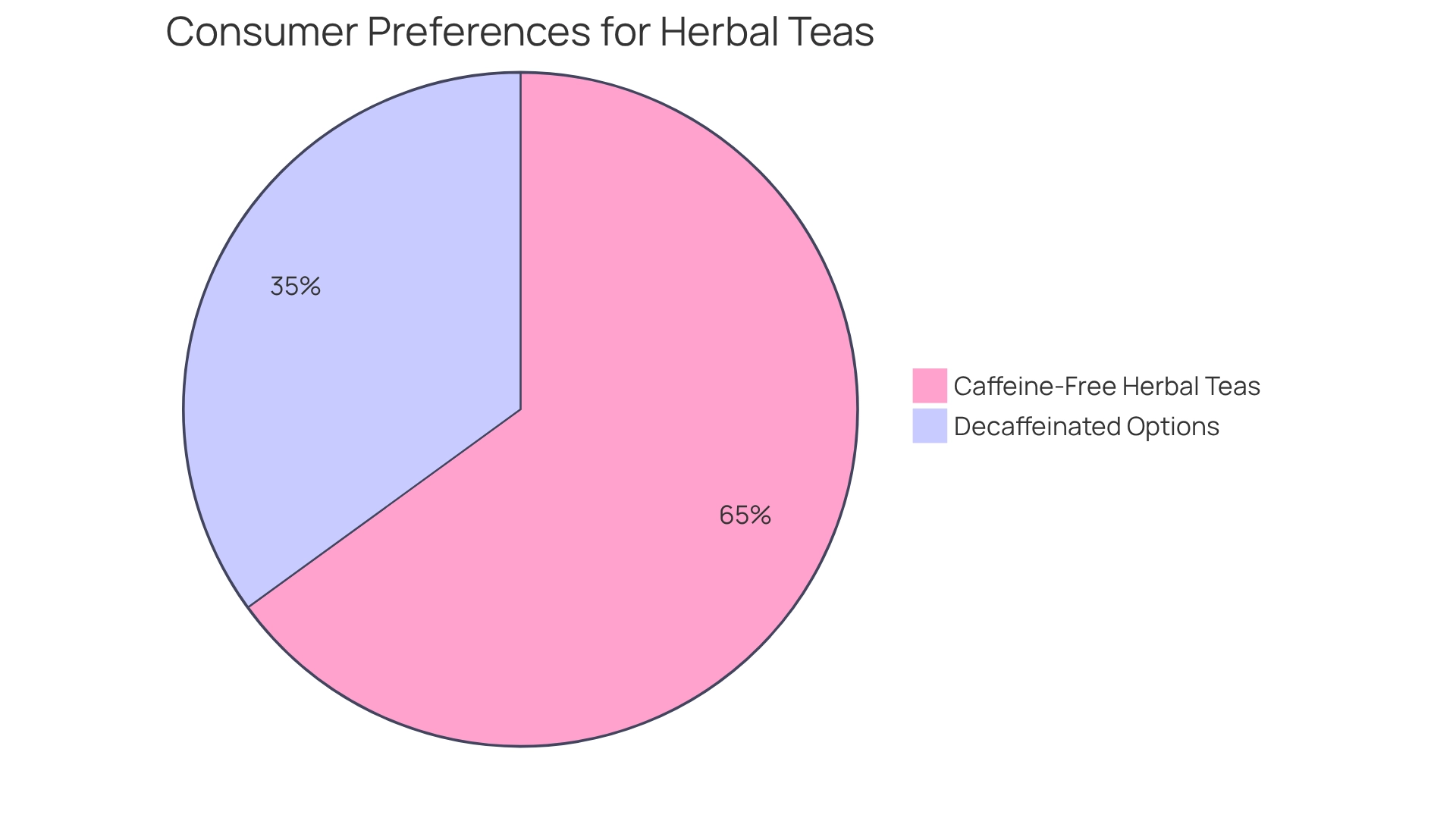
Conclusion
Caffeine-free herbal teas and decaffeinated teas each offer unique benefits that cater to your wellness needs. Herbal tisanes, rich in flavors and health advantages, provide a naturally caffeine-free alternative that promotes relaxation and digestive health. Popular choices like chamomile and peppermint not only satisfy your taste buds but also enhance overall well-being, making them a favored option for health-conscious individuals like you. Conversely, decaf teas maintain the familiar flavors of traditional tea while significantly reducing caffeine content, although some beneficial compounds may be lost in the decaffeination process.
As the trend towards natural wellness solutions continues to rise, the choice between herbal teas and decaf options becomes increasingly important. Understanding your health goals and caffeine sensitivity is crucial in making the right decision. Herbal teas offer a wealth of health benefits, particularly for those seeking soothing beverages that support relaxation and restful sleep. In contrast, decaf teas provide a comforting alternative for traditional tea lovers looking to limit their caffeine intake without sacrificing taste.
Ultimately, embracing either herbal or decaffeinated teas contributes positively to a holistic approach to health. With quality options of our organic loose leaf teas, you can enjoy the flavors and benefits of your chosen beverages while supporting your wellness journey. Making informed choices about tea consumption not only enhances your personal health but also aligns with a growing appreciation for natural remedies in today’s wellness-focused world.
Frequently Asked Questions
What are herbal tisanes, and how do they differ from decaffeinated teas?
Herbal tisanes are caffeine-free herbal teas made from a variety of plants, including herbs, flowers, and fruits. In contrast, decaffeinated teas come from traditional tea leaves, such as black or green, which undergo a process to remove most of the caffeine but may still contain trace amounts.
How much caffeine is typically left in decaffeinated teas?
Decaffeinated teas typically contain trace amounts of caffeine, generally between 1 to 8 mg per cup.
What are some examples of herbal tisanes?
Examples of herbal tisanes include chamomile, peppermint, and rooibos.
What health benefits do caffeine-free herbal teas provide?
Caffeine-free herbal teas are known to promote relaxation and aid digestion, making them appealing for individuals focused on wellness.
What is the consumer preference regarding caffeine-free herbal teas versus decaffeinated options?
A significant percentage of health-conscious individuals prefer caffeine-free herbal teas over decaffeinated options, indicating a trend towards natural wellness solutions.
What does the case study titled 'Caffeine Levels in Different Types of Tea' reveal?
The case study reveals that the common belief that white and green teas contain lower caffeine levels compared to oolong and black teas is misleading. It indicates that white tea may actually have higher caffeine levels than green tea, and overall, all tea types have similar caffeine contents.





